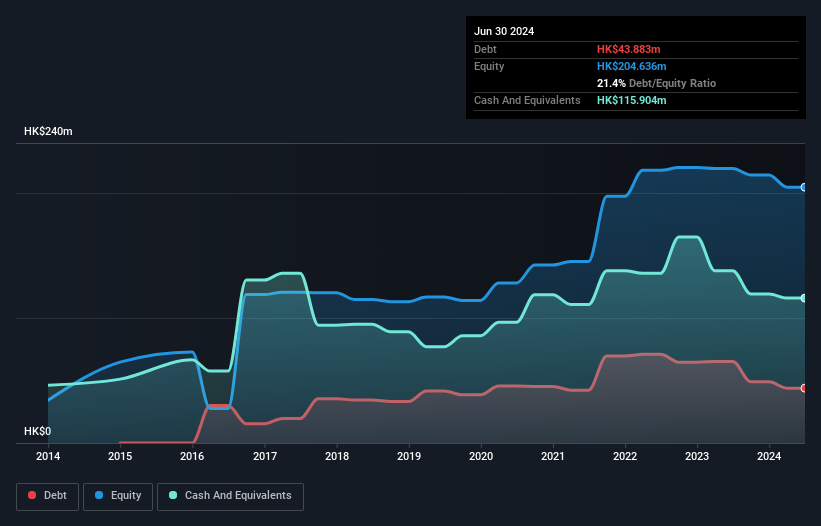Is Ever Harvest Group Holdings (HKG:1549) Using Debt In A Risky Way?
Legendary fund manager Li Lu (who Charlie Munger backed) once said, 'The biggest investment risk is not the volatility of prices, but whether you will suffer a permanent loss of capital.' So it seems the smart money knows that debt - which is usually involved in bankruptcies - is a very important factor, when you assess how risky a company is. We note that Ever Harvest Group Holdings Limited (HKG:1549) does have debt on its balance sheet. But the real question is whether this debt is making the company risky.
What Risk Does Debt Bring?
Debt assists a business until the business has trouble paying it off, either with new capital or with free cash flow. In the worst case scenario, a company can go bankrupt if it cannot pay its creditors. However, a more usual (but still expensive) situation is where a company must dilute shareholders at a cheap share price simply to get debt under control. Of course, plenty of companies use debt to fund growth, without any negative consequences. When we examine debt levels, we first consider both cash and debt levels, together.
View our latest analysis for Ever Harvest Group Holdings
What Is Ever Harvest Group Holdings's Net Debt?
As you can see below, Ever Harvest Group Holdings had HK$43.9m of debt at June 2024, down from HK$65.2m a year prior. But on the other hand it also has HK$115.9m in cash, leading to a HK$72.0m net cash position.

A Look At Ever Harvest Group Holdings' Liabilities
Zooming in on the latest balance sheet data, we can see that Ever Harvest Group Holdings had liabilities of HK$133.0m due within 12 months and liabilities of HK$570.0k due beyond that. Offsetting this, it had HK$115.9m in cash and HK$62.8m in receivables that were due within 12 months. So it can boast HK$45.1m more liquid assets than total liabilities.
This surplus liquidity suggests that Ever Harvest Group Holdings' balance sheet could take a hit just as well as Homer Simpson's head can take a punch. Having regard to this fact, we think its balance sheet is as strong as an ox. Simply put, the fact that Ever Harvest Group Holdings has more cash than debt is arguably a good indication that it can manage its debt safely. There's no doubt that we learn most about debt from the balance sheet. But it is Ever Harvest Group Holdings's earnings that will influence how the balance sheet holds up in the future. So if you're keen to discover more about its earnings, it might be worth checking out this graph of its long term earnings trend.
Over 12 months, Ever Harvest Group Holdings made a loss at the EBIT level, and saw its revenue drop to HK$372m, which is a fall of 27%. To be frank that doesn't bode well.
So How Risky Is Ever Harvest Group Holdings?
Although Ever Harvest Group Holdings had an earnings before interest and tax (EBIT) loss over the last twelve months, it generated positive free cash flow of HK$1.4m. So although it is loss-making, it doesn't seem to have too much near-term balance sheet risk, keeping in mind the net cash. With mediocre revenue growth in the last year, we're don't find the investment opportunity particularly compelling. The balance sheet is clearly the area to focus on when you are analysing debt. But ultimately, every company can contain risks that exist outside of the balance sheet. These risks can be hard to spot. Every company has them, and we've spotted 3 warning signs for Ever Harvest Group Holdings (of which 2 are a bit concerning!) you should know about.
If you're interested in investing in businesses that can grow profits without the burden of debt, then check out this free list of growing businesses that have net cash on the balance sheet.
Have feedback on this article? Concerned about the content? Get in touch with us directly. Alternatively, email editorial-team (at) simplywallst.com.
This article by Simply Wall St is general in nature. We provide commentary based on historical data and analyst forecasts only using an unbiased methodology and our articles are not intended to be financial advice. It does not constitute a recommendation to buy or sell any stock, and does not take account of your objectives, or your financial situation. We aim to bring you long-term focused analysis driven by fundamental data. Note that our analysis may not factor in the latest price-sensitive company announcements or qualitative material. Simply Wall St has no position in any stocks mentioned.
 Index Options
Index Options CME Group
CME Group Nasdaq
Nasdaq Cboe
Cboe TradingView
TradingView Wall Street Journal
Wall Street Journal